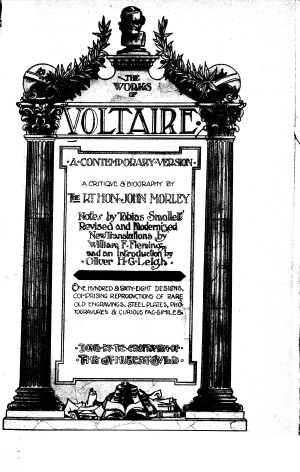
Part of: The Works of Voltaire. A Contemporary Version, in 21 vols. The Works of Voltaire, Vol. IV (Philosophical Dictionary Part 2)
- William F. Fleming (translator)
- Tobias Smollett (notes)
- Oliver Herbrand Gordon Leigh (introduction)
- Voltaire (author)
Volume 2 of the Philosophical Dictionary with entries from “Cannibals” to the “Falsity of Human Virtues.” The Philosophical Dictionary first appeared in 1764 in a pocket edition. It consists of a series of short essays on a variety of topics all of which are tied together as examples of Voltaire’s withering criticism of “the infamous thing” - examples of tyranny and persecution by a privileged orthodoxy in Church and State of those individuals who disagree.